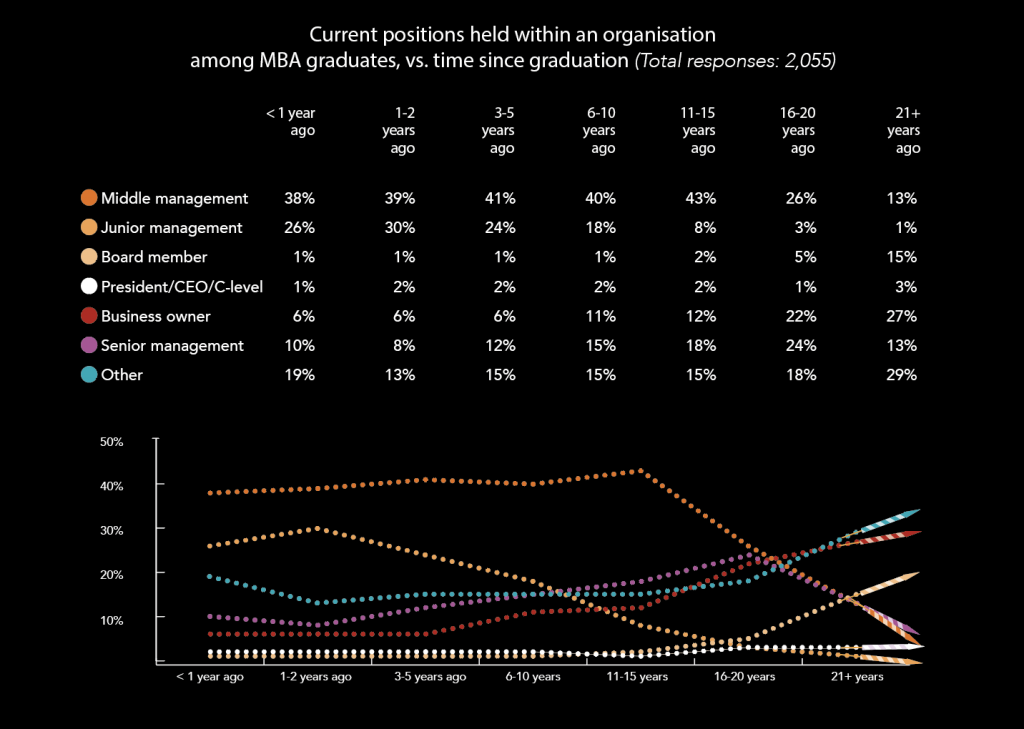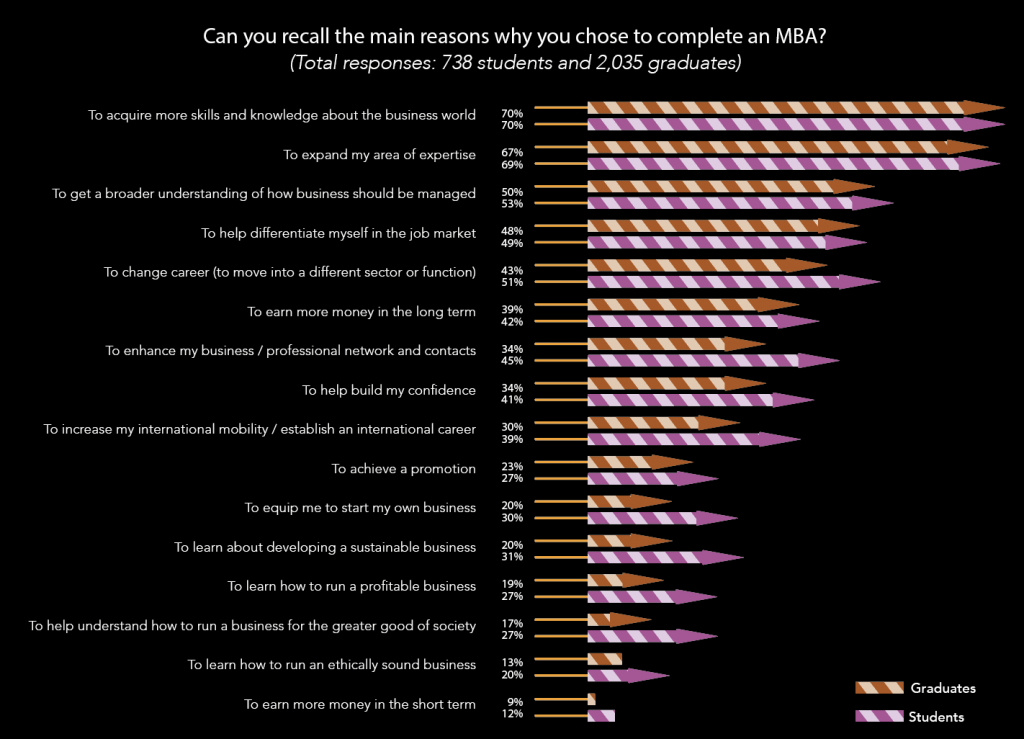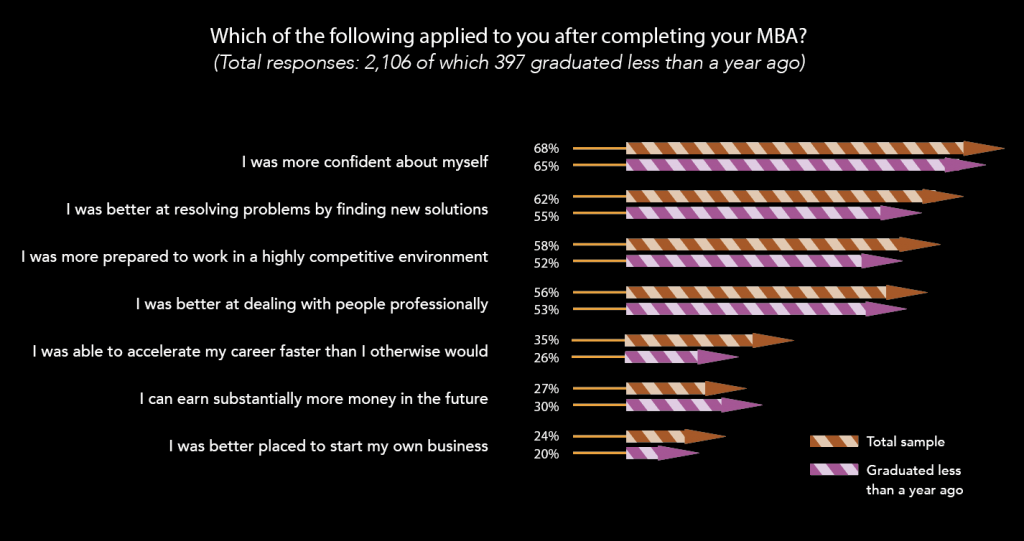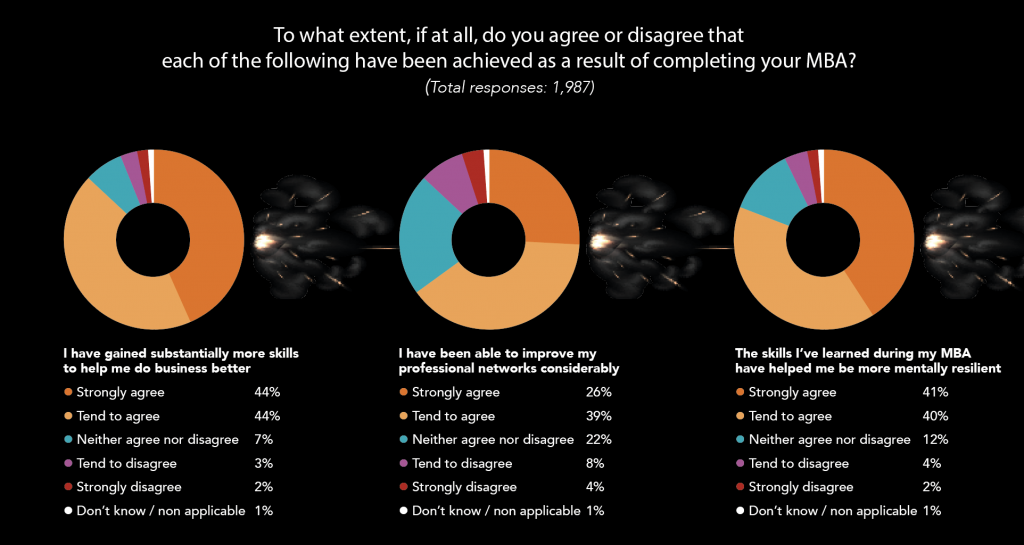AMBA asked more than 2,000 MBA graduates – spanning different generations and geographies – to reflect on why they took the degree and whether it has had the required impact on their professional lives. David Woods-Hale reports
Competition for leadership roles is likely to grow fiercer – 28% of more than 1,000 MBA employers that participated in AMBA & BGA research covered in the last edition of AMBITION questioned if there were too many candidates for too few jobs in 2020.
Against this uncertain backdrop, AMBA & BGA surveyed 2,110 MBA graduates on how well they believe their MBA qualification has served them in their careers. The survey represents the second instalment of AMBA & BGA’s International MBA Research, and considers current roles, functions and levels of seniority, as well as how the skills and knowledge graduates had acquired during their studies were shaping their careers and helping them add value to the organisations for which they work.
The results suggest reasons for cautious optimism in terms of the employment prospects of MBA graduates. While there have been moderate changes in the motivations for doing an MBA over time, particularly among those who are newly graduated, most are happy with the qualification’s impact on their career. Indeed, many also say they landed the right role for them within six months of completing their MBA degree and point to specific skills and employment-related outcomes garnered as a result of their studies.
What are graduates doing? careers and experience
Graduate participants demonstrated the diversity of career paths among MBA graduates when asked about their current industries, with most major areas represented. The most frequently represented sectors within the sample were consultancy (11%); banking and finance (10%); IT (6%); education (6%); energy (5%); government (5%); engineering 4%; and manufacturing (4%).
Delving deeper, the survey sought to find out participants’ functional roles. Again, there was diversity among the sample, with a wide range of functions reported: 18% were in consultancy positions; 16% worked in operations; 16% in sales and/or business development; 10% in finance; 7% in IT; and 6% held a CEO or other general management role.
To gauge participants’ seniority, the survey asked which among a list of job titles most closely represents their role in the organisation in which they worked at the time of completing the survey: 38% were at the level of middle management (incorporating divisional head and principal-level roles); 22% were in junior management roles; 12% were senior managers (incorporating directors, partners, country heads or vice presidents); 9% were business owners; 2% were presidents/CEOs/managing directors; and 2% were board members.
Career development over time
Breaking down this data in conjunction with the length of time passed since participants completed their MBA degree offers an insight into the development of MBA graduates’ seniority over time. Among those who had completed their MBA less than a year before filling out the survey, 26% reported being in junior management roles. The equivalent figure among those who graduated 11 or more years ago is just 8%. Meanwhile, only 1% of those who finished their MBA less than a year before completing the survey are board members, but this increases to 15% among graduates who completed their MBAs more than 21 years before taking part in the survey.
Those who reported being business owners, or entrepreneurs, were much more likely to have graduated from Business School more than a decade ago. Among those graduating in the year prior to the survey, only 6% define themselves as ‘business owners’ compared to 27% of graduates who completed their MBAs more than 21 years before taking part in the survey.
The next question asked participants to detail the size of the organisation for which they were currently working. A total of 65% said they work for a large organisation with more than 250 employees, while 18% work for small-to-medium-sized enterprises (SMEs) with between 10 and 249 employees. Approximately one in 10 said they worked alone in a self-employed capacity; 4% worked for a micro business with fewer than 10 staff members; and 2% classified themselves as entrepreneurs who also employ teams of people.

Why MBA?
Graduate participants were asked to share their reasons for completing an MBA. Their responses were contrasted with a sample of 752 current MBA students, who completed a similar questionnaire.
The top answers from graduates were: ‘To acquire more skills and knowledge about the business world’ (cited by 70% of graduate survey respondents); ‘To expand my area of expertise’ (67%); and ‘To get a broader understanding of how business should be managed’ (50%).
Current students were more likely than graduates to cite the following reasons: ‘To learn about developing a sustainable business’ (cited by 31% of students vs. 20% of graduates); ‘To help build my confidence’ (41% of students vs. 34% of graduates); and ‘To help understand how to run a business for the greater good of society’ (27% of students vs. 17% of graduates).
The results indicate that current students are more concerned about socially responsible and sustainable issues in business and are keen to develop associated skills during their MBA. However, it’s also worth noting that the student sample was more inclined to choose a larger number of reasons for completing an MBA in the survey and their answers are more evenly spread, when compared with their graduate peers.
Have reasons for pursuing an MBA evolved?
The sample was segmented further to explore whether individuals’ reasons for completing an MBA changes with the length of time since participants completed their MBAs and, therefore, to see if the most common motivations for pursuing an MBA have evolved.

Participants that graduated from their MBA less than a year before completing the survey were more motivated to complete an MBA to expand their areas of expertise (64% vs. 55% who graduated 21 or more years ago).
This newly graduated cohort were also more inclined to cite financial motivation than their counterparts who completed their MBA in the 1990s or earlier – 40% of participants that graduated less than a year before completing the survey undertook their MBAs to earn more money in the long term. The equivalent figure among those who graduated 21 or more years ago is 25%. More recent graduates are also more concerned with ethical business, compared to the MBAs of the 1990s and pre-1990s. Among those that graduated less than a year before completing the survey, 21% said they had completed an MBA to learn about developing a sustainable business, and 13% said they had completed the MBA to learn how to develop an ethically sound business. The equivalent figures among those who graduated 21 or more years ago are 7% and 6%, respectively.
Recent graduates were also more likely to have had entrepreneurial motivations behind their decision to undertake an MBA; 23% of those that graduated less than a year before completing the survey said they completed an MBA to equip them to start their own business. This figure decreases gradually with the length of time since graduation, to a proportion of only 9% among those that graduated 21 or more years ago.
Lastly, 42% of those who graduated in the last year were keen to enhance their professional networks through an MBA, but this drops to just 11% among those that graduated 21 or more years ago. In addition, 34% of recent graduates say they took an MBA to increase their chances of having an international career, compared to 16% among those that graduated 21 or more years ago.
Personal development and professional progress
The survey sought to explore elements of personal development and professional progress achieved by graduates as a result of completing an MBA programme. It also examined these achievements through self-perceptions of soft skills as well as tangible metrics, such as salary and seniority.
More than two thirds of graduates (68%) said they were more confident in themselves on completion of their MBA; 62% perceived themselves to be better at solving problems and finding solutions; 58% thought they were better prepared to operate in highly competitive environments; and 56% believe themselves to be better at dealing with people in a professional capacity.

In terms of the harder metrics, 35% said they have been able to accelerate their careers faster than they otherwise would have been, having completed an MBA; 27% believed the MBA has enabled them to earn ‘substantially more money’ post-graduation; and 24% believe that their MBA has enabled them to become an asset to the business community.
When considering only those participants that had graduated from an MBA programme less than a year before completing the survey, the results are slightly different. Among these recent graduates, 55% said they are now better at resolving problems by finding new solutions (compared with 62% of the whole sample); 26% of new graduates said they have been able to accelerate their career faster than they otherwise would have (compared with 35% of the total sample); and 19% said they consider themselves to be an asset to the business community (compared with 24% of the total sample).
Satisfaction with the degree
Moving on, the research sought to gauge graduates’ personal perceptions of the MBA qualification in terms of their own sense of satisfaction.
From the Business School perspective, the results are encouraging – 71% of graduates were either ‘very satisfied’ or ‘fairly satisfied’ with the impact that their MBAs has had on their careers to date.
Graduates were then asked to share more information on the areas in which they believed the MBA has added the most value, in terms of their career prospects.

The results show that 88% of the sample agreed that they had ‘gained substantially more skills to help them do business better’
as a result of completing the MBA; 81% agreed that ‘the skills they learned during their MBA have helped them be more mentally resilient’; and 74% believed ‘they have been able to develop all the business-related skills they wanted’ as a result of completing the qualification.
In terms of salary expectations, graduates were less sure as to how far their MBA had made an impact. While 64% agreed with the statement ‘I feel equipped to reach the salary I want to achieve in the future’ to some degree, 34% did not agree with the statement, and 11% actively disagreed.
When looking solely at MBA graduates that had completed their qualification less than a year before taking the survey, the results revealed a higher level of satisfaction. In all areas measured, recent graduates were either one or two percentage points higher in agreement than other graduates.
Finding the right role
MBA graduates were asked: ‘How long did it take you to find the job you wanted post-MBA?’
Encouragingly, the findings suggest that the largest proportions of MBA graduates find the role they want within six months of completing an MBA. Across all segments of the sample, more than half of all participants said they were either in the job they wanted before starting their MBA, while studying, or within six months of completing the qualification.
Among the full sample of graduate participants, 29% said they already had the role they wanted before starting the MBA, while a further 17% said they landed their desired role while studying the degree.
Post-graduation, 15% said they were in the job they wanted within six months of graduation.
Among participants who graduated less than a year ago, 38% said they are still looking for the job they want. However, the picture changes somewhat for those who graduated 11 or more years ago. Just 7% of those who had graduated 11 -15 years ago said they still did not have the role they wanted, and this dropped to just 4% for those who graduated more than 21 years ago.
Meanwhile, among the most recent graduates, 26% said they already had the job they wanted before starting the qualification, and 18% found their desired role during the MBA.
The global recruitment landscape has changed greatly since the time at which the earliest graduates in our survey completed their MBAs and this is reflected in the findings here. While 49% of those that graduated more than 21 years ago had secured their desired position during their studies or within six months of graduation, the equivalent proportion among those that graduated a year or less before completing the survey is 33%.
However, the findings also suggest that employment prospects remain promising for MBA graduates, with 33% of those that have graduated within the past year saying they landed their desired role during the degree, or within six months of completing it. A further 26% already had the job they wanted before starting the MBA. It’s also worth noting that this is not to say that the remaining 41% were still out of work six months on from graduation, only that they had not yet secured their ideal job, post-MBA.
Volatility caused by geopolitical issues are set to continue and could even exacerbate challenges in the recruitment market, making future trends on MBA recruitment figures hard to predict.
Yet, in spite of such uncertainty, AMBA & BGA’s survey of MBA student and graduates, combined with its survey of MBA employers, indicate that both these groups are confident that MBAs have the skills and qualities that employers need to succeed, and are best placed to face these ongoing and unpredictable challenges.
The view of employers
AMBA & BGA’s International MBA Research is a four-part study of which this forms the second part. Part one is based on a poll of more than 1,000 MBA employers, and seeks to find out how optimistic they feel about the skills and attributes of MBA graduates as being a good fit for their business and the wider economy; as well as to gain some insight into emerging trends in recruitment, in terms of MBA-level positions.
Employers polled were positive about the value of an MBA from a reputable Business School when looking for senior managers. In terms of the quality of MBAs recruited by survey participants, 16% rated MBAs in general as ‘excellent’ and 52% rated their performance as ‘good’.
When asked if MBAs had the relevant skills to thrive within the survey participants’ organisations, 30% strongly agreed and 50% tended to agree with the statement. Meanwhile, 31% strongly agreed and 49% tended to agree that MBAs had the relevant skills to make a significant contribution to the wider economy in their respective countries.
Employers polled were confident that Business Schools are producing MBAs with mindsets focused on maximising profit (42% thought Schools are producing ‘a great deal’ of MBAs focused on this); and 49% thought Business Schools were producing ‘a great deal‘ of MBAs with an international outlook.
In spite of these encouraging findings, and in light of continuing global uncertainty and volatility, employers also revealed their concerns about the recruitment landscape of tomorrow. There was an overwhelming lack of confidence in the future of both global and local economies, with most survey participants taking a conservative – and in some cases pessimistic – view on their recruitment plans for the coming months and years.
With the volume of senior management opportunities predicted to decline in the future, competition for these roles is mounting as a result: more than a quarter (28%) of responding employers said that there were currently too many candidates for too few jobs.
Methodology
Between 27 March 2020 and 27 May 2020 AMBA & BGA conducted its largest-ever online survey of its 49,000 MBA student and graduate members, based in more than 150 countries. A total of 752 current MBA students and 2,110 MBA graduates completed the online questionnaire.
Among the current MBAs, 65% are male,34% are female and 1% preferred not to say. In terms of age, 3% were aged between 18 and 24; 43% were in the age group 25-34; 37% were in the age group 35-44; 14% were aged 45-54; 2% were in the age group 55-64; and less than 1% were aged 65+. Responding students covered a fairly even geographic spread. The most represented region was Europe (excluding the UK) – 27% of student participants were based in this region at the time of the survey. This was followed by 16% in the UK; 13% in Africa; 12% in India; 12% in Asia and the Middle East (excluding India and China); 7% in Latin America; 7% in North America and the Caribbean; 4% in Oceania; and 1% in China and Hong Kong, China.
Among the MBA graduate sample, 71% are male and 29% are female. In terms of age, less than 1% were aged between 18 and 24; 24% were in the age group 25-34; 42% were in the age group 35-44; 22% were aged 45-54; 9% were in the age group 55-64; and 2% were aged 65+.
Responding graduates also covered an even geographic spread. The region that was represented most frequently was again Europe (excluding the UK) – 29% of MBA graduate participants were based in this region at the time of completing the survey. This was followed by 20% based in the UK; 11% in Africa; 11% in Asia and the Middle East (excluding India and China); 9% in Latin America; 8% in North America and the Caribbean; 7% in India; 3% in Oceania; 2% in China and Hong Kong, China.
More than two thirds of graduate participants in the sample (69%) completed their MBAs within the past five years, while 15% completed their MBA 11 or more years ago. Eight out of 10 participants (80%) were in full-time employment (more than 30 hours per week) at the time of filling out the survey; 8% were working less than 30 hours per week; and 11% were not working at the time.



